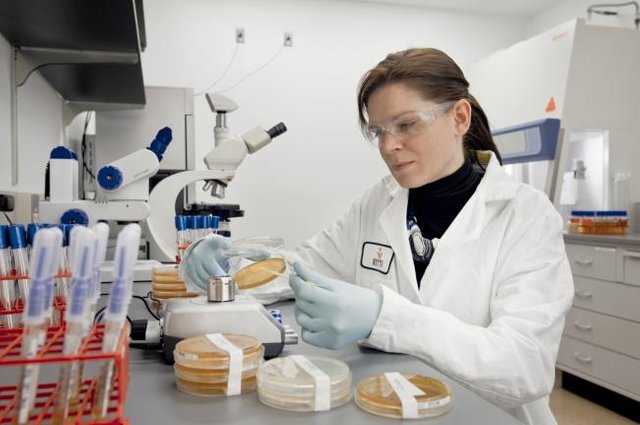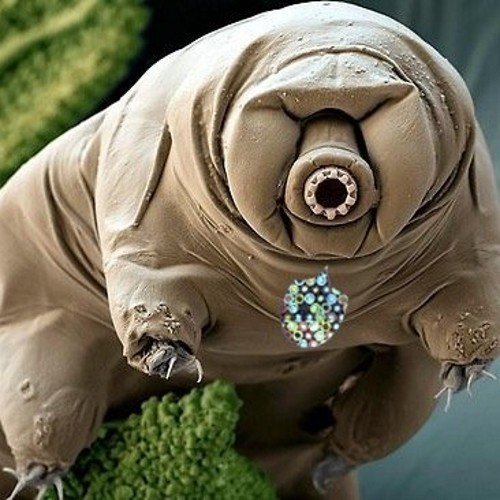When you talk about things that can be disastrous that would seriously affect our planet, attention falls on the survival of the human race. But after this, who would stay on Earth?

A team of scientists from the Universities of Oxford and Harvard has revealed the species that will remain on the Earth's surface longer than any other: the Tardigrade or Water bear, an 8-legged microorganism that reaches a life expectancy of up to 10 billion years, reports the website of the University of Oxford.
The study, published in the journal ' Scientific Reports ', indicates that the tardigrades are able to survive up to 30 years without food or water and withstand extreme temperatures of up to 150 degrees Celsius, the deep sea and even the frozen vacuum of space.
Research is based on the assumption that a global catastrophe is occurring on a cosmic scale. Thus, scholars have considered three possible scenarios: the impact of a large asteroid, the explosion of a supernova in the vicinity of the sun and a burst of gamma rays. However, they stipulate that all of them are unlikely and that the scope of their impact would not be strong enough to, for example, boil the planet's oceans and destroy these microorganisms.

"To our surprise we find that," although nearby supernovae or large asteroid impacts would be catastrophic for people, tardigrades may not be affected, so it seems that life, once it gets underway, is hard to erase completely, "says David Sloan, co-author of the study.
Is there life beyond?
Rafael Alves Batista, co-author of the study, explains that the tardigrades are "close to the indestructible" on earth and stresses that "there may be other examples of resilient species in other parts of the universe." "In this context, there is a real case to look for life on Mars and other areas of the solar system," he adds.
"In general, if the tardigrades are the most resilient species on earth, who knows what else is out there?" he raises.







Sabes que me imagine que sería la cucaracha y no un microorgamismo como tal, cada día hay seres que evolucionan más que otras, ojala así fueramos los humanos, y es triste ver como el ser humano destruye y muy pocos construyen.Para un ejemplo ver como hay personas que acaban con la fauna y flora de nuestro ecosistema.
Downvoting a post can decrease pending rewards and make it less visible. Common reasons:
Submit
Congratulations! This post has been upvoted from the communal account, @minnowsupport, by ROCO25 from the Minnow Support Project. It's a witness project run by aggroed, ausbitbank, teamsteem, theprophet0, and someguy123. The goal is to help Steemit grow by supporting Minnows and creating a social network. Please find us in the Peace, Abundance, and Liberty Network (PALnet) Discord Channel. It's a completely public and open space to all members of the Steemit community who voluntarily choose to be there.
If you like what we're doing please upvote this comment so we can continue to build the community account that's supporting all members.
Downvoting a post can decrease pending rewards and make it less visible. Common reasons:
Submit
Wou, parece un topo, me agrada este microorganismo. La existencia de una especie como la nuestra no está garantizada, somos destructores y constructores, y dependemos de animales y plantas, aunque en algun momento cuando todo escasee veremos si podemos adaptarnos a los inventos artificiales para sobrevivir. es un buen post, pensé que hablarías de las cucarachas, que han soportado muchos años.
Downvoting a post can decrease pending rewards and make it less visible. Common reasons:
Submit
oh fantastico xD
Downvoting a post can decrease pending rewards and make it less visible. Common reasons:
Submit
Que buen post,ojala nosotros la especie humana pudieramos vivir todo ese tiempo.
Downvoting a post can decrease pending rewards and make it less visible. Common reasons:
Submit
buen post muy entretenido
Downvoting a post can decrease pending rewards and make it less visible. Common reasons:
Submit
Realmente los científicos hacen un muy buen trabajo, es increible como este microorganismo puede alcanzar esta vida de hasta 10 mil millones de años.
Su nombre tardigrades nada mas me hace pensar que son casi indestructibles leer que pueden aguantar tanto me lo confirma.. muy buen post, interesante..
Downvoting a post can decrease pending rewards and make it less visible. Common reasons:
Submit
Interesante post.... la imagen es la que impacta.... parece de las Guerras de las Galaxias. jajja
Downvoting a post can decrease pending rewards and make it less visible. Common reasons:
Submit
excelente informacion cesar, siga asi, vamos por las ballenas
Downvoting a post can decrease pending rewards and make it less visible. Common reasons:
Submit
Que execelente post, me gusta esta informacion.
Downvoting a post can decrease pending rewards and make it less visible. Common reasons:
Submit
Que barbaridad! me gustaría tener esa resistencia de un tardigrado! ahora que piense en una especie resistente lo tendré como ejemplo!
Downvoting a post can decrease pending rewards and make it less visible. Common reasons:
Submit
excelente post
Downvoting a post can decrease pending rewards and make it less visible. Common reasons:
Submit
¡Caramba! lo que los científicos siguen descubriendo, y yo que pensé que el organismo más resiliente hasta ahora eran las cucarachas jajaja
Downvoting a post can decrease pending rewards and make it less visible. Common reasons:
Submit
Interesante lo que se va descubriendo buena nota
Downvoting a post can decrease pending rewards and make it less visible. Common reasons:
Submit
Interesting.
Downvoting a post can decrease pending rewards and make it less visible. Common reasons:
Submit
Que bueno
Downvoting a post can decrease pending rewards and make it less visible. Common reasons:
Submit
Good!
Downvoting a post can decrease pending rewards and make it less visible. Common reasons:
Submit